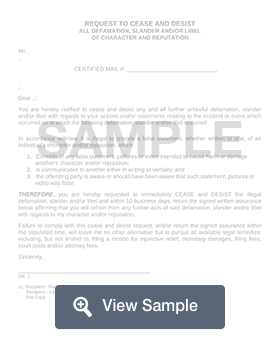Cease and Desist for Slander and Libel Letter Form
A cease and desist slander and libel letter is used to demand that the recipient stop spreading false information. Libel is false information that is published in written form. Slander is false information that is spoken. Generally, a cease and desist slander and libel letter demands that the behavior stop immediately. This letter should include details about the occurrences of misinformation as well as explain what may happen if the recipient does not comply.
What is a Cease and Desist Letter (Slander)?
A cease and desist letter is used to stop a party from continuing a certain activity. This letter will be used for any actions that involve defamation, slander, or libel. A cease and desist letter such as this should include specific details about the false statements that are defaming, slandering, or libeling the sender.
A cease and desist letter is a formal request to stop another party from making harmful statements that may be damaging to your personal reputation. The letter also lets the party know that you will undertake appropriate legal action if they do not stop slander and libel immediately.
Other Names
In the context of slander, other names for a cease and desist letter include:
- Demand Letter;
- Violation Letter; and
- Takedown Letter

Create a Cease and Desist for Slander and Libel Letter in minutes with our professional document builder.
Types of Defamation
There are two types of defamation:
- Slander
- Libel
State laws vary with regards to how these two terms are exactly defined within their jurisdictions. But in general, slander is a form of defamation in which someone verbally makes an untrue statement about another person and as a result, harm is done to that person’s reputation and or livelihood. Libel, on the other hand, is the act of making defamatory statements about another person in writing, such as in a newspaper or magazine articles.
In most cases, those accused of defamation, be it slander or libel, may be brought to trial in a civil court where they can be held liable to pay damages to the victim. A court can also grant a cease and desist order. A few states even allow those who are accused of defamation to be criminally prosecuted, however, these case are very rare.
If you have questions as to whether conduct constitutes slander or libel, you should seek legal advice. A law firm that specializes in slander and libel will be able to answer your legal questions and help you file a defamation action if it becomes necessary.
Why use a cease and desist slander letter?
Often the threat of being sued is sufficient to persuade someone to stop doing things that are harmful to others. Not many people care to embroiled in the paperwork and legal processes involved in a defamation lawsuit. Apart from the time, attorney's fees, and court costs associated with defending a lawsuit, having the court rule against you can be very expensive in terms of the financial penalties and damage to your reputation. A cease and desist letter is the best way to give someone the chance to cease their harmful statements and conduct without getting a court involved.
Depending on the severity of the defamation, the tone of the cease and desist letter can be more or less threatening. If the defamation is presently causing damage to you or your business, the cease and desist letter should have a serious tone and threaten immediate legal action if the conduct continues. If the defamation only has the potential to be harmful, the cease and desist letter can be less threatening.
Components of a cease and desist slander letter
Cease and desist letter templates are available online. Every cease and desist letter should include language that accomplishes the following:
- Describe the defamatory statement or libelous written statement or statements that are being made and demand that the recipient stop making these statements.
- Provide the reason why these statements are defamatory.
- Describe how these defamatory statements are a threat to your reputation, livelihood and/or business.
- Inform the recipient that you intend on filing a lawsuit if they do not stop making these defamatory statements and if they do not retract them within a certain amount of time.
The document should then be titled “Demand to Cease and Desist”, be dated, and include the names and addresses of both the recipient and sender in the letterhead.
How to write a cease and desist slander and libel letter
When writing a cease and desist letter, it is important that you stay with the tried and true method of effective cease and desist letter writing. Follow these steps to write your cease and desist letter:
Step 1 – Select a template from our library.
Step 2 – Enter the name and address information of the sender and the date the document is being drafted.
Step 3 – Enter the recipient's name followed by the party whose is being defamed.
Step 4 – Enter the State in which the defamed party resides followed by a written demonstration of the defamatory statements that are being made and that have lead to this letter being drafted.
Step 5 – Enter the amount of time (in days) that the recipient has to reply. Be precise.
Step 6 – To complete the document, the defamed party's legal counsel must sign their name in the space allotted.
When your letter is completer, send it certified mail, return receipt requested.
